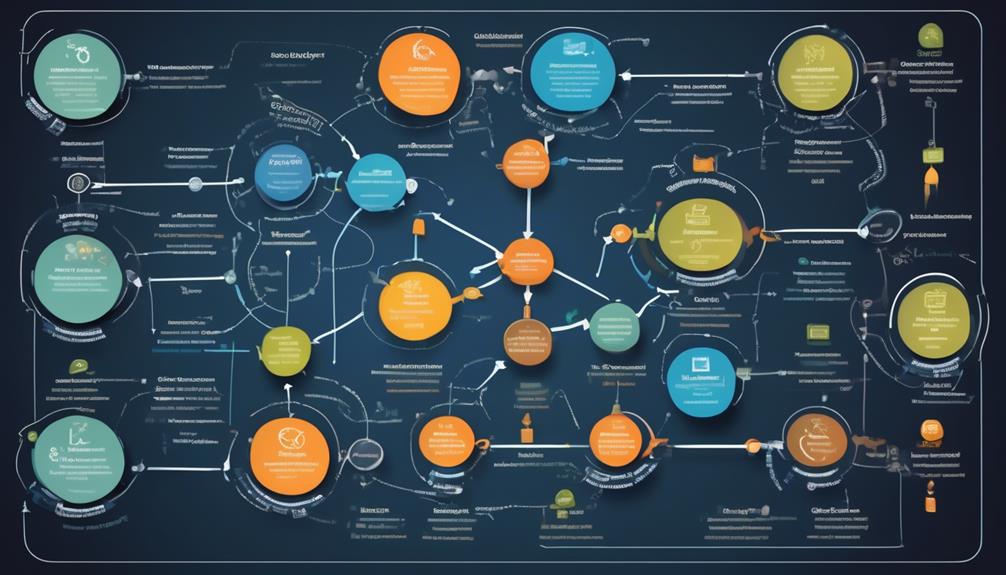We develop and execute software testing plans, identify and record software bugs, and examine problems concerning program operation.
But have you ever wondered about the broader impact of Software Quality Assurance (SQA) on the software development lifecycle?
How does SQA ensure that the end product meets the desired quality standards?
In this discussion, we'll explore the key responsibilities of SQA professionals, their role in ensuring high-quality software products, and the impact of their work on the reliability and user-friendliness of software applications.
Key Takeaways
- SQA professionals are responsible for executing software test plans and identifying and documenting software problems and defects.
- They play a crucial role in ensuring that software meets required quality standards at every stage of the development lifecycle.
- SQA professionals contribute to the reliability and user-friendliness of software by collaborating with stakeholders, designing testing scenarios prioritizing user experience, and enhancing usability through testing.
- Their role also includes providing input to technical reviews, overseeing the change management process, and uncovering and documenting software defects.
Key Responsibilities of SQA Professionals
As SQA professionals, we diligently execute software test plans to ensure strict adherence to quality standards, consistently identifying and documenting software problems and defects for timely resolution.
Our role involves designing comprehensive test plans, scenarios, scripts, and procedures to cover various aspects of software functionality. We analyze and document problems with program function, prioritizing and addressing software defects to enhance the overall product quality.
We also play a crucial role in providing input on functional requirements and potential problems to improve the software development process. Our responsibilities extend to conducting regression testing to ensure that new developments don't adversely impact existing functionalities.
Impact on Software Development Lifecycle

Playing a crucial role in ensuring software products meet quality specifications, SQA professionals impact the entire software development lifecycle by verifying implementation of procedures and catching product shortcomings before public release.
This ensures that the software development process is efficient and that high-quality products are released to the public.
SQA engineers test and validate the software at every stage, ensuring that it meets the required quality standards. They also implement quality control measures, using techniques such as auditing, reviewing, code inspection, and simulation to enhance the overall efficiency and productivity in the development process.
Additionally, SQA's focus on preventing breakdowns, disruptions, and security breaches saves time and money, thereby influencing the maintenance, support, and deployment stages of the software development lifecycle.
Moreover, their emphasis on continuous improvement and collaboration with cross-functional teams impacts the feedback, iteration, and improvement stages of the software development lifecycle, ensuring that the software meets the evolving needs and expectations of the end-users.
Ensuring High-Quality Software Products
In our quest for ensuring high-quality software products, we diligently develop and execute software test plans to guarantee the functionality and reliability of our products. As Software Quality Assurance (SQA) professionals, we focus on meticulous testing, identification, and documentation of software defects to ensure that the final product meets the highest quality standards. We actively engage in code reviews, working closely with software engineers and testing engineers to address potential problems and enhance the overall quality of the software. Our role extends beyond mere testing, as we provide crucial input on functional requirements and collaborate with cross-functional teams to ensure that every aspect of the software aligns with quality standards and industry regulations.
To emphasize the significance of our efforts in ensuring high-quality software, we can refer to the following table:
| SQA Activities | Description |
|---|---|
| Software Test Planning | Development and execution of comprehensive test plans to ensure functionality |
| Defect Identification | Meticulous analysis and documentation of software defects for improvement |
| Collaboration | Providing input on functional requirements and collaborating with teams |
Role in Reliability and User-Friendliness

How can Software Quality Assurance (SQA) professionals ensure the reliability and user-friendliness of software products through comprehensive testing processes and methodologies? As Quality Assurance Engineers and Testers, we play a crucial role in upholding the quality of software. Here's how we accomplish this:
- Collaboration: We work closely with software engineers and stakeholders to establish clear testing objectives and design testing scenarios that prioritize user experience and ease of use. This collaboration ensures that the software meets high standards of reliability and user-friendliness.
- Automation: We develop and maintain automated test scripts and frameworks to continuously evaluate and enhance the user-friendliness and reliability of software products. This approach allows us to efficiently execute various testing procedures, including usability testing, to ensure software stability and user satisfaction.
- Input on Design Considerations: We provide valuable input on design considerations and functionality to improve the user experience and overall reliability of software products. By incorporating our insights, we contribute to the development of user-friendly and reliable software.
Uncovering the Real SQA Function
To uncover the real function of Software Quality Assurance (SQA), we systematically examine the activities and processes that ensure software products meet quality specifications and adhere to established procedures.
SQA, performed by Quality Assurance Engineers and Assurance Analysts within software companies, involves various crucial tasks. These include providing input to Technical Reviews, diagnosing problems in software, ensuring that testing is comprehensive, and assuring the overall quality of the software.
One of the essential functions of SQA is change management, which involves overseeing the process of implementing changes in the software and ensuring that these changes don't compromise the quality of the product.
By emphasizing these functions, SQA ensures that software companies can produce high-quality products that meet customer needs and expectations.
Additionally, SQA professionals play a critical role in uncovering and documenting software defects, which is essential for maintaining the integrity and reliability of software products.
Through their meticulous attention to detail and methodical approach, SQA professionals contribute significantly to the overall success and trustworthiness of software products.
Frequently Asked Questions
What Is the Role of Software Quality Assurance?
The role of software quality assurance is crucial in ensuring higher quality software products. We develop and execute software test plans, collaborating with developers and stakeholders to identify defects and provide input on functional requirements.
Our work reduces the need for constant patches and upgrades, increasing customer satisfaction and trust. Additionally, we address cybersecurity vulnerabilities, protect customers from data breaches, and adhere to industry standards for data security and privacy.
Our efforts result in improved software quality and customer satisfaction.
What Does QA in Software Do?
We develop and execute software test plans, identify and document problems, and design comprehensive test plans to verify software implementation. Our analysis of program function provides input on functional requirements and potential problems.
Additionally, we develop testing programs, techniques, and methodologies to ensure software quality, security, and compliance with industry standards. This attention to detail and methodical approach ensures the mastery of software quality assurance.
What Is QA Roles and Responsibilities?
In QA roles and responsibilities, we develop and execute test plans to ensure software quality and functionality. We identify and document defects, collaborate with stakeholders, and create automated test scripts.
Our responsibilities include conducting regression and performance testing to ensure software stability and responsiveness. Ultimately, our focus is on ensuring software products meet high standards of quality and functionality, contributing to improved customer satisfaction and market share.
What Does Quality Assurance Do?
We ensure software quality by:
- Developing and executing test plans
- Identifying and documenting problems
- Collaborating with stakeholders
- Addressing cybersecurity vulnerabilities
Our responsibilities include:
- Maintaining automated test scripts
- Executing testing procedures
- Prioritizing defects to ensure software stability
We adhere to industry standards and regulations for:
- Data security
- Privacy
This enhances the development process and ensures product safety. Our attention to detail and methodical approach ensures software functionality and overall quality.
Conclusion
In conclusion, software quality assurance professionals play a crucial role in ensuring the high quality and reliability of software products.
Their attention to detail and methodical approach help uncover potential defects and problems before public release, leading to more user-friendly and efficient software.
Like a well-oiled machine, SQA professionals work tirelessly to ensure that software meets the desired quality standards, ultimately leading to satisfied customers and a successful development process.
Rick, our Software Quality Assurance Writer, is the creative force behind many of our insightful articles and course materials. His unique background in software development, fused with his natural flair for writing, allows him to convey complex QA concepts in a way that is both informative and captivating. Rick is committed to keeping abreast of the latest trends and advancements in software testing, ensuring that our content remains not just relevant, but at the forefront of the field. His significant contributions are instrumental in helping us fulfill our mission to deliver premier QA education.










